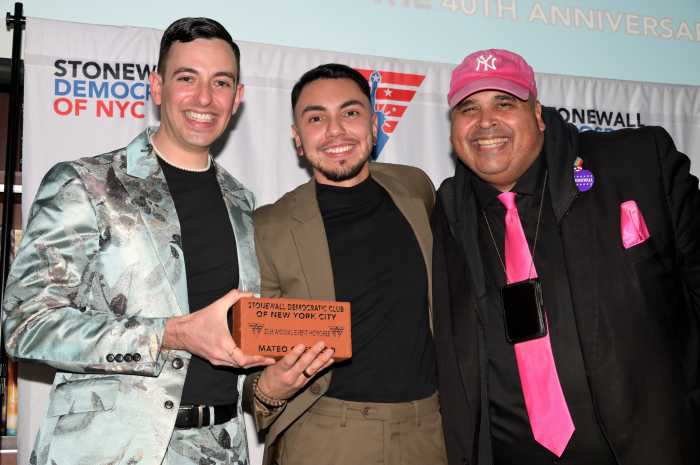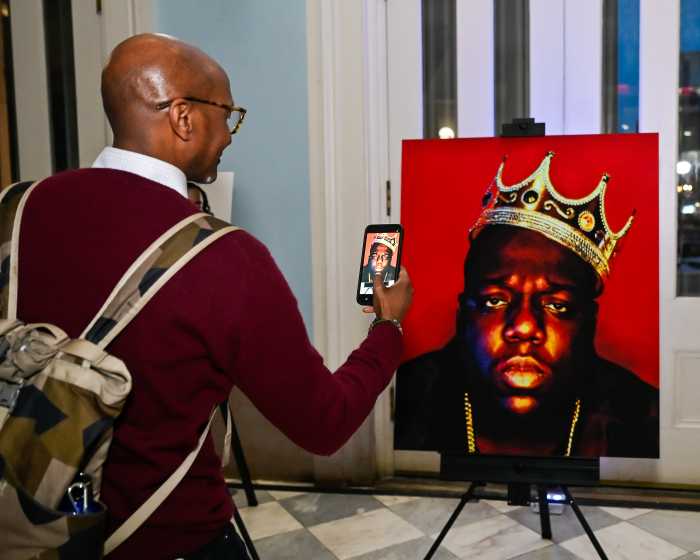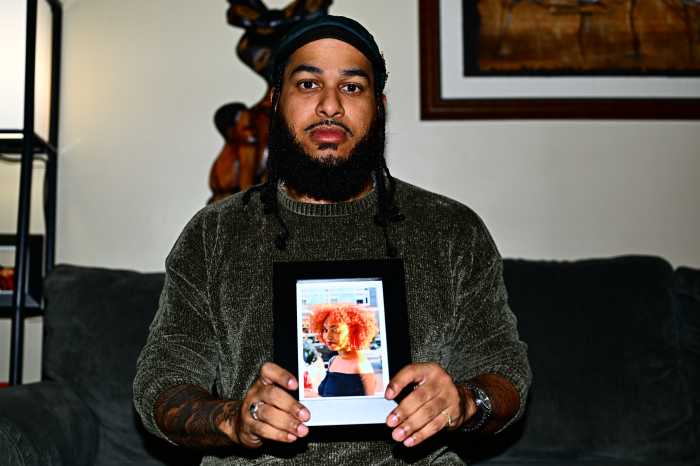The Human Rights Campaign (HRC) sounded the alarm during its recent briefing on the state of anti-LGBTQ legislation across the United States.
“Last year was one of the worst years we have ever seen for anti-LGBTQ+ legislation being advanced in the states,” HRC President Kelley Robinson said on February 14during the opening of an hour-long virtual brief on the state of anti-LGBTQ legislation. This year is shaping up to be even more intense than 2022, LGBTQ leaders warned.
Robinson was joined by experts on anti-LGBTQ legislation who provided professional insight, particularly about the attacks on transgender youth during the discussion, including out gay Senator Shevrin Jones of Florida; National Center for Transgender Equality policy director Olivia Hunt; and the University of California, San Francisco’s Child and Adolescent Gender Center co-founder and medical director Dr. Stephen Rosenthal.
Texas transgender youth activist Libby Gonzales, 12, and Kelly Carter, a Virginia parent of a transgender son and activist Merrill, also shared their experiences fighting against anti-transgender laws and policies.
The brief was moderated by Rich Luchette, associate vice president at Precision Strategies.
A ‘historically bad’ year ahead
“We anticipate this year being historically bad already,” Robinson said.
Already so far this year, Utah and South Dakota governors have approved bans on gender-affirming care for minors. In 2022, Utah’s State Legislature overrode Governor Spencer Cox’s veto of a ban on transgender youth playing sports. A judge reversed the legislature’s ban with some restrictions pending legal challenges.
HRC is tracking similar bills aimed at banning gender-affirming care in Mississippi, Tennessee, West Virginia, and Wyoming. Additionally, they are watching bills restricting bathroom usage according to assigned gender at birth in Arkansas and Idaho.
Furthermore, HRC is watching the development of new bills aimed at limiting drag shows in states like Tennessee and bills preventing educators from using a student’s preferred pronouns in states like Utah.
This year, 28 anti-LGBTQ bills have passed at least one chamber as of February 14, Oakley said, and 10 of those bills are specifically anti-transgender.
Overall, 340 anti-LGBTQ bills have been introduced across the country, Oakley said. In 2022, there were more than 315 anti-equality bills introduced in state legislatures around the country, and of those 29 were signed into law.
HRC is opposing more than 250 bills, 150 of which target transgender people, with more than 90 bills introduced in 24 states targeting gender-affirming care, Robinson added.
“That is more anti-trans bills than we have ever seen before,” Robinson said, noting the bills are swiftly being moved through legislatures “and we are on track to have more anti-LGBTQ+ bills filed than ever before.”
Robinson and Oakley said anti-LGBTQ lawmakers and organizations are targeting gender-affirming care, bathrooms, and curriculum censorship. Oakley added that they are also seeing medical practitioners, insurance companies, and public facilities and funding being targeted to block people from receiving gender-affirming care, and powerful media outlets, like the New York Times, which came under fire for its anti-transgender coverage February 15.
An additional concern is the power of social media, Oakley pointed out that the “grooming” stories that suddenly made headlines last year were started by 10 people on Twitter, among them Georgia Representative Marjorie Taylor Greene and Republican Florida Governor Ron DeSantis.
“The people that are coming for LGBTQ+ rights are the same people [that are] coming for reproductive rights [and] for voting rights,” Robinson said. “They don’t want to just set back the progress of the last 40 years, but the progress of the last 400 [years].”
Like women’s health clinics that provide abortion services, gender-affirming medical providers are under attack. Dr. Rosenthal said two children’s hospitals, including UCSF, have received bomb threats.
“That’s another extremely stressful and unpleasant aspect of all of this,” he said.
A report from the Movement Advancement Project, “Under Fire: The War on LGBTQ People in America,” released February 16 echoed HRC leaders’ concerns and the challenges ahead.
They are coming for us
Anti-LGBTQ conservatives are “making it harder to have the peoples’ voices heard both during the legislative work and for years to come,” Jones said, pointing to Florida’s conservative laws to cut funding for LGBTQ programs as well as barriers to voting rights. There are a few variations from bill to bill, but “the bills are astonishingly similar,” Oakley said.
The bills are coming from national anti-LGBTQ organizations the American First Legal, American Principles Project, Alliance Defending Freedom, Heritage Foundation, and Family Policy Alliance, which are sponsoring the legislative and administrative attacks on the queer and transgender communities, she said.
The Southern Poverty Law Center designated these organizations as hate groups.
Intent to harm
The “purpose is to harm LGBTQ people,” said Oakley.
Hunt said, “We all already know that these relentless attacks on transgender people are causing real harm, even in the states where legislation fails.”
The transgender advocate cited statistics from the Trevor Project’s 2022 LGBTQ youth survey, which showed that transgender and non-binary youth are worried about local and state laws denying them access to gender-affirming care (93%), bathroom access (91%), and playing sports (83%).
“The numbers are frightening and they’re tragic,” Hunt said. “Every single day, trans youth are facing the threat of harassment, discrimination, and violence. That’s all made worse when some politicians and other public figures are targeting them in the hopes of gaining or holding on to political power.”
Gonzales and Carter Merrill made it clear that these anti-LGBTQ bills and policies aren’t just hurting LGBTQ youth, but their parents, their siblings, and their communities. Gonzales called the government leaders supporting anti-LGBTQ, especially anti-trans, bills “the biggest bullies.”
She described her sleepless nights when lawmakers return to the legislative session in Texas and the effect the proposed bills have on her siblings. She told the virtual audience her little brother and sister have nightmares that their parents are going to be taken away from them because they seek care for her.
“I’ve spent nearly half of my life begging my legislators to see me,” Gonzales said. “I’m tired and scared.”
“I just want my lawmakers to get out of my way and let me be who I am,” a kid who loves “drawing, reading, going to school, sewing, and running,” she said.
Carter Merrill spoke about her experience during the past three years navigating anti-transgender school board members and school administrators at her son’s school. She said her school district in the greater Richmond area, Virginia’s capital, contracted with the Alliance Defending Freedom to write the school’s current governing policy. She said the district also ordered all “safe space” stickers to be removed from the schools.
Despite the fact that her son has been surrounded by a supportive community, the anti-transgender rhetoric still found him.
“A fellow student recently brought bibles to school and threw them at our son while yelling at him that he will burn in hell,” Carter Merrill said. “It’s exhausting and stressful to manage on top of an already difficult life journey.”
The fear tactics are ignoring science. Dr. Rosenthal explained that the science, policies, and best practices are in place to provide age-appropriate gender-affirming health care. Rosenthal cited pre-puberty cutoffs for medical treatment and the availability of reversible hormone blockers as examples.
Major professional medical and psychiatric associations, the World Health Organization, American Medical Association, and many others support gender-affirming care for youth, the experts noted.
Dr. Rosenthal said many studies have shown positive mental health and social results for transgender youth who receive gender-affirming care early.
Good news and doubling down
Robinson and Oakley pointed out that there are positive indicators emerging. The red wave fell flat in last November’s primary elections. They claimed HRC defeated 91% of the anti-LGBTQ bills in legislatures across the country last year.
HRC is not just railing against anti-LGBTQ legislation. The organization is supporting bills such as Michigan’s Elliott-Larsen Civil Rights Act — which would amend Michigan’s civil rights code to include protections for sexual orientation and gender identity and gender expression — and Minnesota’s bill banning conversion therapy.
HRC is not alone in fighting back against anti-LGBTQ bills. On February 16, out gay Equality Caucus Chair Mark Pocan of Wisconsin announced Vice Chairs Pramila Jayapal of Washington and Sara Jacobs of California as co-chairs of its Transgender Equality Task Force.
Jayapal, who has a transgender daughter, and Jacobs, who has a transgender brother and a gender non-conforming sibling, pledged to fight back against anti-LGBTQ legislation, especially anti-transgender bills, in Congress.
Robinson pledged HRC would beat back anti-LGBTQ legislation — particularly anti-transgender bills.
“This year, we are going to do it again,” Robinson said. “We’re ensuring that these… anti-LGBTQ+ extremists who are doubling down on political agenda do not win. We are ensuring that we show them that we are greater than all of their hate. We have the public on our side. We have the strategy on our side. We have our lives on the line.”


































